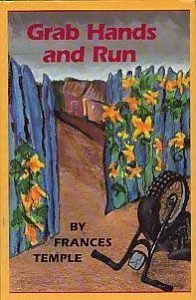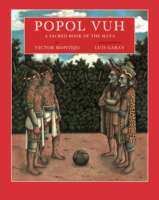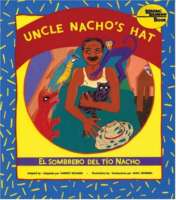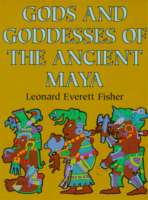 An El Salvadorian family flees political oppression in their homeland and takes a perilous journey north, through Mexico to America, where they hope they will find a better life. A compelling, provocative, and exciting novel. Details of the brutal realities in El Salvador are dexterously woven into the story of one family?s struggle to beat the odds.
An El Salvadorian family flees political oppression in their homeland and takes a perilous journey north, through Mexico to America, where they hope they will find a better life. A compelling, provocative, and exciting novel. Details of the brutal realities in El Salvador are dexterously woven into the story of one family?s struggle to beat the odds.
Author: Yoo Kyung Sung
Rata-Pata-Scata-Fata: A Caribbean Story
This is the story of Junjun, a little boy who wants to help his mother, but who doesn’t really want to exert any effort in the process. Instead, he invokes the nonsense phrase, “rata-pata-scata-fata” to accomplish several tasks she sets before him: getting a fish for dinner, finding a lost goat, and collecting a bucket of tamarinds. Lastly, she asks him to fill the rain barrel. Junjun lies on the ground, repeats the words several times, and the chores are completed. Of course, no magic is really involved, only coincidence-or is it?
Celebrate! In Central America
Describes the background and customs associated with some of the festivals of Central America.
On the Pampas
An account of a little girl’s idyllic summer at her grandparents’ ranch on the pampas of Argentina.
Pascual’s Magic Pictures
Having saved enough money to buy a disposable camera, Pascual goes into the Guatemalan jungle to take pictures of monkeys, but the results are not what he expected.
Teenage Refugees from Haiti Speak Out (In Their Own Voices)
These books begin with historical overviews of Haiti, including the reasons for recent political unrest. The first-person narratives of young refugees follow. All of the teens tell why they left their native countries, how they made their journeys, their experiences and difficulties in North America, and if they plan to return to their homelands. The introductions state that the young people were interviewed; it is unclear exactly when these conversations took place. It seems in Haiti as if they occurred prior to the reinstatement of President Aristide.
Popol Vuh: A Sacred Book of the Maya

One of the few Maya documents to survive the Spanish conquest, the Popol Vuh describes the creation of the Maya universe and of humans. It tells the tale of the Hero Twins, who defeated the gods of the underworld in a ball game, and details the legendary history of the Quiche Maya rulers until their imprisonment and torture by the Spanish. Equivalent to the Bible and the Greek and Roman mythologies, the Popol Vuh is the essential text of Mayan culture.
The Children of Bolivia (World’s Children)

Bolivia is home to two distinct native cultures the Aymara and the Quechua as well as mestizos, blacks, and Europeans. Lifestyle is determined in large part by whether one dwells in one of the large cities like La Paz or Santa Cruz, or in rural areas like the forested Yungas or Amazon Basin. In this largely pictorial book that focuses on children living in the different regions, some of this information is specifically stated.
El Sombrero Del Tío Nacho / Uncle Nacho’s Hat

When Ambrosia gives her Uncle Nacho a new hat, he tries to get rid of his old one, but to no avail. No matter what he does, the pesky hat keeps coming back to him. This classic folktale from the Puppet Workshop of Nicaraguan National Television, vividly illustrated by Mira Reisberg and presented in a bilingual edition, is a parable about the difficulties of making changes and shaking off old habits. The book includes an account of the origins of the story.
Gods and Goddesses of the Ancient Maya

Gives the history of the principal gods and goddesses of the ancient Mayans, including Hunab Ku, Itzamna, Ix Tab, and Ah Puch.
